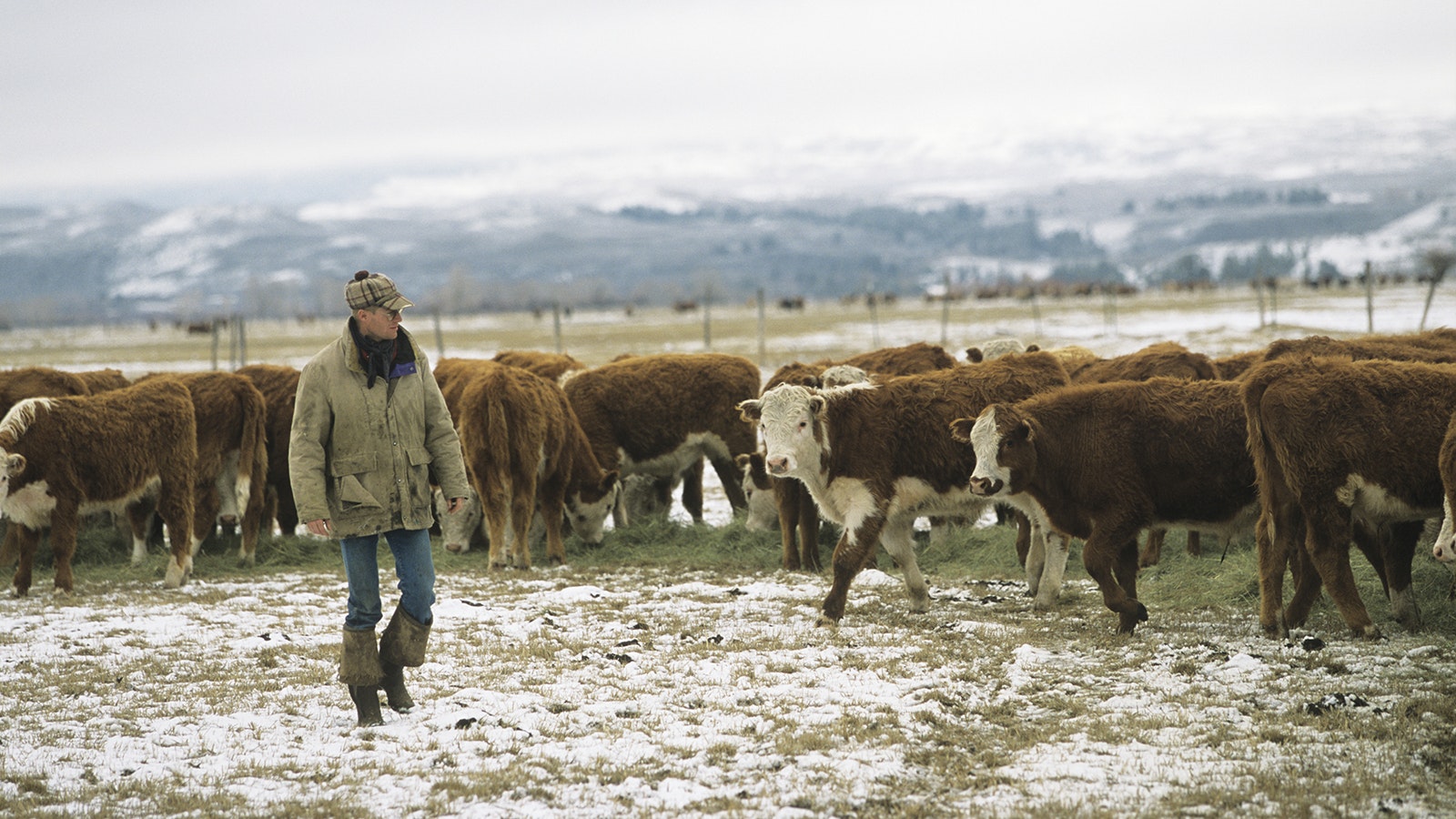BURNS — Wayne and Kim Mozley of Cheyenne had heard of a natural remedy that might help ease the cough from a cold — elderberry tonic.
It sounds pretty exotic, but the Mozleys knew just where they might find some of this natural remedy in Wyoming — at the Lucky Buffalo Farm Stand near Burns, just outside of Cheyenne.
The store looks tiny from the outside. It looks like a cute little farm shed, maybe double the length of the smallest standard shed size. But the store is much bigger inside than it looks.
Go inside, and it’s a dizzying array of every possible local product in every possible nook and cranny. Not every product is Wyoming made, but the ones that aren’t, come from other family farms.
There’s not a single inch that doesn’t have something handmade, from candles and lotions to wooden whisks that clean pots and pans, amidst all kinds of local food.
You’ve got your homemade vanilla — two different kinds — and your homemade apple sauce. There’s a selection of Baer’s jellies and jams in all kinds of flavors, as well as two flavors of all-natural beef sticks made at the Harding Ranch.
Bags of freshly fried tortilla chips show up on a regular basis from a woman in Torrington, store owner and manager Joee Rain Pavlica-Kari told Cowboy State Daily, along with a selection of freeze-dried foods like gravy, pinto beans, and chili.
There are even jars of beef tallow suitable for cooking purposes. A recent addition that’s following another health foodie trend.
Fresh beef in various cuts, including tomahawk, merlot, and oyster, come in from the Meriden Ranch. There’s also fresh cow’s milk, as well as fresh eggs, from the Allman homestead.
There’s homemade ice cream from Josie’s Creamery, and then there’s Pavlica-Kari’s personal favorite — salted caramel ganache tartlets.
The list of locally produced products just goes on and on and on. And that list does indeed include elderberry tonics.
Not just one kind either. There’s a choice of either Elderberry Elixir or Elderberry Syrup.
The first contains a wee bit of vodka, which acts as both preservative and extraction agent, Pavlica-Kari explained to the Mosleys. That pulls more of the beneficial compounds from the berries, while ensuring no bacteria can grow in the mixture.
The syrup, meanwhile, has no vodka, but it has been sweetened. Sugars, whether from honey or other sources, can also prevent microbial growth by drawing water out of bacteria. That prevents anything from growing and multiplying.
The Mozleys settled on the tonic after a little discussion about which product best fit their needs and walked out the door with both elderberry tonic and big smiles.
To Pavlica-Kari, the whole exchange typified exactly what her store is all about.
“Local food is the backbone,” she said. “I mean, we have over 70 people here who rely on the local foods for their families. Like the Allmans. Not only their foods, but their other products. That’s what they do. That’s how they make their money, or part of their money.”
Unleashing Ingenuity With Food Freedom Act
Local food venues have been a rising trend in the Cowboy State ever since it adopted the Food Freedom Act in 2015. Wyoming’s law has been strengthened a few times since adoption and now allows nearly all types of homemade foods, as well as selling eggs and dairy products through “designated agents.”
Most of Wyoming’s larger cities now have their own store with foods produced under the Food Freedom act. Riverton, Lander, Jackson, Sheridan, Gillette — all of these cities have one, and more are being added all the time. These stores are also finding an ever-growing population of people interested in local products.
In fact, a recent University of Wyoming study that unpacks this trend finds that Wyomingites are already injecting $24.4 million into Wyoming’s economy with local food purchases. And there’s plenty of room left for that economic impact to grow.
The study finds that if every Wyomingite on average spent just 5% of their food-at-home budget on local foods, this would contribute an additional $36.3 million to the state’s GDP, even after accounting for reduced purchases from conventional grocery stores.
That bottom line, though, doesn’t capture the most important benefit that Pavlica-Kari sees from her store. For her, it’s all about neighbors helping neighbors.
“This is all about just supporting the community, instead of somebody else,” she said. “I think that was the backbone (of America), and it still needs to be the backbone. But what happened is, it got commercialized, and then (local producers) were pushed to the side.”
She loves seeing not only the plethora of products that have found their way into her store, but the numbers of local consumers who have made the store and its local products a favorite.
“People come in for those because they are from farms in Wyoming and from around the United States,” she said. “They want to support them, rather than products that comes from other countries.”
Changing Consumer Tastes
One of the big draws to food freedom stores reflects broadly changing consumer tastes. There’s a growing disdain for modern processing that people have come to associate with less than healthy outcomes.
That includes the removal of nutrients, making foods less nutrient dense, as well as extra added sugars and fats and preservatives to enhance shelf life of foods.
America has long had an obesity epidemic, and some believe ingredients like high fructose corn syrup are linked to that. Several studies looking into high fructose corn syrup have also pointed to links to both obesity and colorectal cancers, including one funded by the National Cancer Institute which found it was driving tumor growth in mice by lengthening the finger-like protrusions of theintestinal lining called the villi.
That kind of information has people looking for alternatives that feel fresher and healthier, and that have less processing rather than more.
High fructose corn syrup is a particularly effective shelf stabilizer for baked goods. But it doesn’t taste sweet. That means it lacks the usual taste cues a person would get that they’re eating quite a few added carbohydrates.
Some companies have responded by providing new alternatives that lack such ingredients.
But there’s something very alluring to today’s jaded consumers in buying something from someone who lives near them, someone they may know, who has an ingredient list that doesn’t require a chemistry degree to understand.
And that’s what Lucky Buffalo Farm Stand offers, in spades. The ingredients list for bread has only the things you’d expect at the store — flour, yeast, salt, sugar. That’s a list a third grader can read and understand all by themselves, and there’s nothing that sounds like it came from a chemistry set like cholecalciferol (vitamin D), calcium propionate, or ethoxylated mono- and diglycerides.
Not a day goes by, Pavlica-Kari said, when she doesn’t have someone come into the store and tell her about a product like milk or bread that they have been unable to eat until they found a locally made, less processed alternative in her store.
“(Processed stuff) is making people so sick,” she said. “People can come out here who haven’t had the availability to drink milk, like myself,” she said. “I couldn’t drink milk, but I can drink goat milk, and I have zero intolerance to it.”
Not The Expected Customers
The idea for the Lucky Buffalo Farm Stand initially came from Pavlica-Kari’s brother.
“I have two other companies, so this was not really in my wheelhouse,” she said. “But his conviction was so grand.”
At first, she thought her customers would most likely come from nearby I-80 travelers. But she was completely wrong about that. While some might use I-80 to get to her store, which is just down the road from the nearby TA Travel Center, most of her customers live in the area.
They tell her all the time that her store has been a godsend.
Like Duane Merz, who lives in nearby Hillsdale.
“I got to a point where I was getting milk from the store and if I over-consumed, I was getting bad athlete’s foot,” he said.
So, as an experiment, he decided to try raw milk and see whether that helped clear up the problems.
“It was an allergic reaction,” he said. “With the raw milk, nothing.”
Now, instead of a gallon of pasteurized milk from the grocery store, he’s switched over to raw milk instead. He drinks as much of that as he wants every week now —without any more athlete’s foot.
“This is much better the fresher it is,” he added. “If it sits a little too long, it’s still good for consumption, but it’s not as sweet.”
In that case, he often lets it turn to buttermilk, which works well for pancakes whenever the grandchildren visit.
Of course, he’s aware that raw milk that’s improperly handled could also have unhealthy pathogens in it. But that’s the other thing he loves about the Lucky Buffalo Farm Stand. This is the kind of store where customers know the names of their producers. Many are people who live in and around the community, too, so they’re neighbors.
Like the Allman sisters, Heidi, Katie and Kristi, who Pavlica-Kari refers to as her “farmistas.” They help her man the store, but they also bring in cow’s milk and other products from their family’s homestead, where the family produces basically all the foods they need, from meat and milk to vegetables from their garden.
The fact that Merz’s dollars are supporting a local family, someone he walks into the store and sees every week, is an added bonus, one that gives him a sense of satisfaction that money alone can’t buy.
Contact Renee Jean at renee@cowboystatedaily.com
Renée Jean can be reached at renee@cowboystatedaily.com.





















